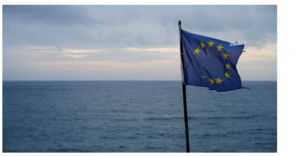A plea for more subsidiarity instead of totalitarian central government control from Dr. Ulrich Horstmann
It is not a question of trivialising the health risks posed by the corona virus. It was right, according to the judgements of the vast majority of medical experts, to act decisively after the governments in the EU countries had long hesitated. Whether, however, whole societies and their economic life had to be paralysed in the process was certainly not without alternative. After all, there was no targeted „safeguarding“ of the particularly vulnerable population groups – the elderly and people with serious illnesses. This is hardly comprehensible. In addition, the interstate border traffic of persons within the EU was largely blocked. We will only be able to judge whether this was appropriate later.
In any case, it is true that all the necessary precautions must be taken, also to prevent future pandemics. Some panic reporting in the public media, however, has meanwhile given the impression that this is a world-eradicating „killer virus“ that has awakened memories of badly made horror films.
It seemed as if reality was catching up with us. I have rarely seen so many extremely frightened people. But at some point, our lives were supposed to return to normal, or will the ’state of emergency‘ decreed in many states become the new normality? Is there an executive coup d’état that was prepared insidiously and is now accelerating?
I think we all feel that the world we know is undergoing radical change. Freedom seems to be being sacrificed for our supposedly higher physical security. ‚Opportunity makes freedom thieves‘ (Gerald Mann). The virus could intensify the mental breeding ground for a ‚totalitarian prohibition regime‘. When would it be sufficiently justified to speak of a ‚health dictatorship‘, of which Juli Zeh warned in her novel ‚Corpus delicti: A Trial‘, which was published in 2009? Is the reporting fair, or is our attention so focused that alternatives to the harsh government measures are no longer even discussed?
The reduction to the point of abolition of (basic) rights and permanent digital surveillance may soon be considered normal by getting used to it. That would be ‚Orwell 2.0 live‘ – or even worse. In his novel ‚1984‘, Winston Smith still knew that the system, led by ‚Big Brother‘, was his opponent, who was giving him a brainwashing. This critical reflection seems to be missing today. Packaged in a humane manner, coercive measures are accepted that seemed unthinkable months ago. The experiences of the ‚old people‘ from the Nazi era have largely faded, as have their warning stories. They have shaped me. As early as the 1970s, my father, who has since passed away, regarded the freedom-limiting and controlling fiscal interventions of our governments at federal and state level in North Rhine-Westphalia as completely excessive. And he was surprised that the youth who would be expropriated in the foreseeable future did not take to the streets. Even the GDR regime, now overcome for a generation, never seemed to be able to resurrect in renovated form as „GDR 2.0“ (Max Otte). Totalitarian coercive regimes seemed to be far removed.
Modern supervisors skilfully exploit the fears they themselves have fomented by first creating the conditions for them. Thus, a compulsory ‚anti-corona app‘ could be introduced, with excessive and permanent restrictions on freedom – as is already the case in France, although some regions are hardly affected by the virus.
The competition between the countries in Germany, on the other hand, is stimulating. Chancellor Merkel would like to make the fight against the virus a top priority, but the prime ministers of the Länder are using their executive powers. Markus Söder in Bavaria is acting rather quickly and briskly, Armin Laschet in North Rhine-Westphalia rather hesitantly, and the basic rights of citizens are less restricted. The balancing act between freedom and security must be rebalanced again and again.
In a recent interview in the Tagesspiegel (26.04.2020), Bundestag President Wolfgang Schäuble first pointed out that not everything else must take a back seat to the protection of life: „This is not right in this absolute. Fundamental rights restrict each other. If there is an absolute value in our Basic Law at all, then it is the dignity of the human being. That is inviolable. But it does not exclude that we must die“.
„We must not leave the decisions to the virologists alone, but must also weigh up the enormous economic, social, psychological and other consequences. To simply shut everything down for two years would have terrible consequences. «
In the best tradition of Ludwig Erhard, Wolfgang Schäuble thus points out the right measure. Domestic aid programmes now go beyond any reasonable framework and are unique worldwide. They reach 35% of the gross domestic product (China only reaches 4.8% and the USA 9.9% according to an overview in the Handelsblatt of 24.04.2020, p. 47). This means that Germany has now at the latest said goodbye to Ludwig Erhard’s economic policy guidelines.
In addition to the restrictions on fundamental rights, which are likely to remain in place for some time to come, a new ’soli‘ and a one-off property levy, a kind of ‚burden sharing‘ as after the Second World War, due to the corona virus, are also being discussed. The question ‚who is going to pay for this?‘ is thus still unresolved for the time being, but the basic tenor is that the ‚rich‘ will be financially called upon – obviously also in the case of wrong decisions by politicians.
What will happen next? The Corona pandemic will keep us busy for the time being. It is not only the virus itself that is a cause for concern, but also the increasing conflict between the European Member States.
National solutions dominate and little consideration is given to neighbours. But the strong state, especially when it wants to control from above, is not convincing. The central state does not necessarily manage to cope better with pandemics, as France shows.
Young people must work to strengthen the rule of law. They should also use all political means to oppose centralized state control from above and oppose the planned further restructuring of the state pension system at their expense (and there is more to come in the near future).
Subsidiarity remains the trump card. In view of the spiral of intervention in societies and the economic cycle, which depends on open borders, we must ask ourselves whether the EU as we know it can still be saved? In the book ‚SOS Europa‘, Stephan Werhahn and I and other well-known co-authors have already pointed out the dangers. Back then, the European clock was still set at five to twelve, and now? Do we still have a chance to make the EU more federal, democratic and market-based again?
We should definitely seize it before it is too late.






